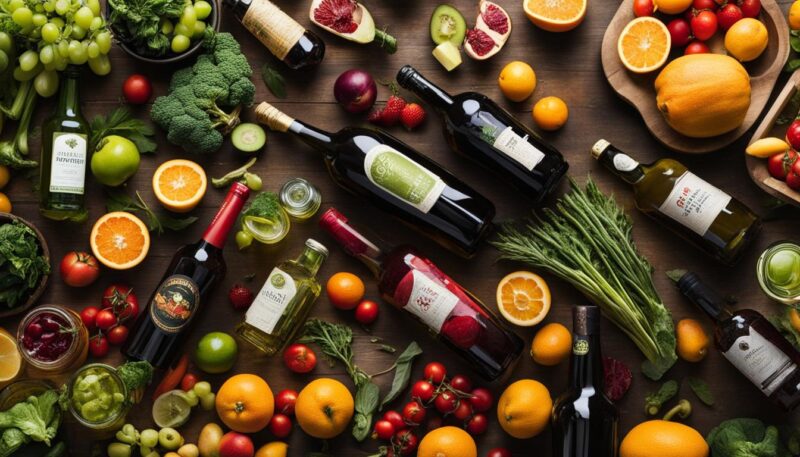As the popularity of veganism continues to grow, many individuals are seeking vegan alternatives in various aspects of their lifestyle, including their choice of alcohol. If you’re a whiskey lover and follow a vegan diet, you may be wondering if whiskey is vegan-friendly. In this article, I will explore the world of whiskey and provide you with all the information you need to know about its ingredients and vegan status.
Key Takeaways:
- Whiskey may or may not be vegan, depending on the ingredients used during its production.
- Non-vegan ingredients commonly found in alcoholic beverages include milk, cream, honey, and gelatin.
- There are vegan alternatives available in the form of vegan beer, wine, and spirits, which use plant-based or clay-based fining agents.
- It is essential to check labels, contact manufacturers, and utilize online vegan resources to ensure the whiskey you choose aligns with your vegan lifestyle.
- Making informed choices about the alcohol we consume allows us to maintain our vegan principles while enjoying our favorite beverages.
Common Non-Vegan Ingredients in Alcoholic Beverages
When it comes to alcoholic beverages, it’s important for vegans to be aware of common non-vegan ingredients and fining agents that are often used during processing. These ingredients may not be listed on labels, making it challenging to determine if a particular drink is vegan-friendly or not. Here are some of the non-vegan ingredients to look out for:
Milk, Cream, Whey, and Lactose
Some alcoholic beverages, particularly creamy liqueurs, may contain milk, cream, whey, or lactose. These ingredients are used to enhance texture and flavor. It’s essential to check the ingredient list or contact the manufacturer to ensure the drink is vegan.
Honey and Eggs
Honey and eggs are commonly used in certain alcoholic beverages, such as mead or egg-based cocktails. These ingredients are added for sweetness or as emulsifiers. Vegan alternatives are available, but it’s crucial to check the label or ask for clarification before consuming.
Isinglass, Gelatin, Carmine, and Chitin
Other non-vegan ingredients to watch out for include isinglass, gelatin, carmine, and chitin. Isinglass is a substance derived from fish bladders and is used to clarify certain wines and beers. Gelatin is made from animal collagen and can be found in some spirits or jellied liqueurs. Carmine, a red pigment, is derived from crushed cochineal insects and may be used in some alcoholic beverages. Chitin, derived from shellfish, can be used in certain drinks to provide a smoother mouthfeel. These ingredients may not be clearly labeled, so it’s important to do thorough research or reach out to the manufacturer for clarification.
Being aware of these common non-vegan ingredients will help vegans make informed choices when selecting alcoholic beverages. It’s always recommended to check ingredient lists, contact manufacturers, or look for official vegan certifications or symbols on labels to ensure a drink aligns with a vegan lifestyle.
| Non-Vegan Ingredients | Usage |
|---|---|
| Milk, Cream, Whey, Lactose | Enhance texture and flavor |
| Honey and Eggs | Sweetness or as emulsifiers |
| Isinglass, Gelatin, Carmine, Chitin | Clarification, texture, or mouthfeel enhancement |
A Guide to Vegan Beer
When it comes to enjoying a cold beer, vegans need to be aware that not all beers are created equal. While most commercial beers are vegan, there are some that may contain non-vegan ingredients. It’s important to know what to look for when choosing a vegan beer. Below, I’ve outlined common non-vegan ingredients to watch out for.
| Non-Vegan Ingredients | Description |
|---|---|
| Isinglass | A gelatin-like substance derived from fish bladders, used as a fining agent to clarify beer. |
| Gelatin | A protein obtained from animal sources, often used as a fining agent in beer production. |
| Whey | A byproduct of cheese production, added to some beers for flavor and texture. |
| Lactose | A milk sugar, used to add sweetness to certain beer styles. |
| Honey | A common ingredient in honey beers, imparting sweetness and floral notes. |
To ensure you’re choosing a vegan beer, look for craft breweries that explicitly label their beers as vegan. This makes it easier for vegans to identify suitable options. Additionally, there are online resources like Barnivore that provide comprehensive lists of vegan-friendly beers. By being informed and attentive, vegans can enjoy a refreshing brew without compromising their lifestyle.
Remember, the world of beer is vast, and there are plenty of vegan options out there. So next time you’re in the mood for a cold one, reach for a vegan beer and raise your glass to making ethical choices!
A Guide to Vegan Wine
When it comes to choosing vegan-friendly alcoholic beverages, wine can sometimes be a bit tricky to navigate. While many wines are naturally vegan, some winemakers use fining agents derived from animals during the clarification process. It’s important for vegans to be aware of these non-vegan ingredients and know how to identify vegan wines.
Fining agents such as isinglass, gelatin, albumin, casein, and carmine are commonly used in winemaking. Isinglass, for example, is derived from fish bladders and is used to remove impurities from the wine. Gelatin, albumin, and casein, which come from animal sources, are also used to clarify the wine and improve its appearance. Additionally, carmine, a red dye made from crushed insects, may be used to give wine a vibrant color.
However, there are many vegan-friendly alternatives available. Winemakers have started using clay-based fining agents or plant-derived proteins to clarify their wines. These vegan options effectively remove impurities without the need for animal-based products. Some wineries even go the extra mile to label their wines as “vegan” to make it easier for consumers to identify them.
| Fining Agent | Animal-Derived | Alternative |
|---|---|---|
| Isinglass | Yes | Clay-based fining agents |
| Gelatin | Yes | Plant-derived proteins |
| Albumin | Yes | Plant-derived proteins |
| Casein | Yes | Plant-derived proteins |
| Carmine | Yes | N/A |
When purchasing wine, vegans should look out for labels indicating that the wine is vegan-friendly. Some wineries go beyond just listing the ingredients and clearly state that their wines are suitable for a vegan lifestyle. This can provide peace of mind for consumers who want to make sure they are making ethical choices when it comes to their wine selection.
By being informed about fining agents and seeking out vegan-friendly options, vegans can enjoy a wide range of wines without compromising their lifestyle. Whether it’s a crisp white, a robust red, or a sparkling rosé, there are plenty of vegan wines to suit every palate.

A Guide to Vegan Spirits
When it comes to enjoying spirits as a vegan, it’s important to be aware of non-vegan ingredients that may be present in flavored liquors. While unflavored spirits are generally vegan, flavored liquors often contain additives such as milk, cream, honey, or carmine. It’s essential to check the ingredients or contact the manufacturer to determine the vegan status of a specific spirit or cocktail.
Some cocktails may also contain non-vegan ingredients, so it’s crucial to inquire about the ingredients used when ordering at a bar or restaurant. By being mindful of the ingredients and making informed choices, vegans can still indulge in spirits while maintaining their lifestyle.
As a vegan, it’s important to double-check the ingredients in flavored liquors and cocktails. Don’t be afraid to inquire about the ingredients used, as it’s better to be safe than sorry. By being proactive, you can ensure that your spirits align with your vegan values.
To assist vegans in identifying vegan spirits, some brands may label their products as vegan-friendly. However, since not all manufacturers provide this information, it’s crucial to review the ingredients list or reach out to the brand directly. By doing so, you can make informed choices and enjoy spirits that align with your dietary preferences.
While navigating the world of vegan spirits may require a little extra effort, it is entirely possible to find options that are vegan-friendly. By staying informed and checking ingredients, vegans can enjoy their favorite cocktails and spirits without compromising their lifestyle choices.
Tips for Finding Vegan Alcohol
Finding vegan alcohol can sometimes be a challenge, as not all manufacturers are required to list ingredients on labels. However, there are several tips and resources that can help you identify vegan options. Here are some strategies to consider:
- Contact the manufacturer: If you’re unsure about the vegan status of a particular alcohol, reach out to the manufacturer directly. They can provide you with information about the ingredients and production process to help you make an informed decision.
- Look for vegan symbols: Some alcoholic beverages may carry a certified vegan symbol on their packaging. These symbols indicate that the product has met specific standards and does not contain any animal-derived ingredients.
- Check for allergen statements: While not all alcoholic beverages list ingredients, some may include allergen statements on their labels. These statements can provide valuable information about potential allergens, including milk, eggs, or honey.
- Look for carmine statements: Carmine, a red pigment derived from crushed insects, is sometimes used in alcoholic beverages. If you’re avoiding carmine, check for statements specifically mentioning its absence.
- Utilize online vegan resources: Websites like Barnivore provide comprehensive databases of vegan-friendly alcoholic beverages. By simply searching for a specific brand or type of alcohol, you can quickly find out if it’s vegan or not.
By using these strategies and resources, you can navigate the world of alcoholic beverages more confidently and find options that align with your vegan lifestyle. Remember to always double-check and verify with the manufacturer if you have any doubts or concerns. Cheers to enjoying vegan-friendly drinks responsibly!
Table: Vegan Alcohol Finding Tips
| Tip | Description |
|---|---|
| Contact the manufacturer | Reach out to the manufacturer directly to inquire about ingredients and production processes. |
| Look for vegan symbols | Check for certified vegan symbols on packaging to ensure the product is free from animal-derived ingredients. |
| Check for allergen statements | Look for allergen statements on labels that may indicate the presence of common allergens. |
| Look for carmine statements | Verify if the product explicitly states the absence of carmine, a red pigment derived from insects. |
| Utilize online vegan resources | Explore websites like Barnivore that provide extensive databases of vegan-friendly alcoholic beverages. |

Conclusion
In conclusion, choosing vegan alcohol is a lifestyle choice that reflects our commitment to living a compassionate and conscious life. By raising awareness about non-vegan ingredients and their presence in alcoholic beverages, we can make informed choices that align with our values and beliefs.
Being aware of the ingredients used in the production of alcoholic beverages empowers us to select options that are in line with our vegan lifestyle. Whether it’s beer, wine, or spirits, taking the time to read labels, contact manufacturers, or utilize online resources can aid us in finding vegan options.
It is essential to stay informed and educated about the different non-vegan substances used in the production process. By doing so, we can actively support companies and brands that prioritize ethical practices and provide vegan-friendly alternatives.
Cheers to making informed choices about the alcohol we consume and embracing a vegan lifestyle that extends beyond what we eat. Let’s raise our glasses to a compassionate existence!
FAQ
Are all alcoholic beverages vegan?
No, not all alcoholic beverages are vegan. Many contain non-vegan ingredients and fining agents, such as milk, cream, whey, lactose, honey, eggs, isinglass, gelatin, carmine, and chitin.
How can I identify non-vegan ingredients in alcoholic beverages?
Non-vegan ingredients to look out for in alcoholic beverages include milk, cream, whey, lactose, honey, eggs, isinglass, gelatin, carmine, and chitin. Checking the ingredient listing or contacting the manufacturer can help determine the vegan status of a specific beverage.
Are commercial beers vegan?
Most commercial beers from established breweries are vegan. However, some beers may contain non-vegan ingredients such as isinglass, gelatin, whey, lactose, or honey. Craft breweries may explicitly label their beers as vegan.
How can I tell if a wine is vegan?
Vegan wines use clay-based fining agents or plant-derived proteins. Non-vegan wines may use animal-based fining agents such as isinglass, gelatin, albumin, casein, or carmine. Some wineries label their wines as vegan, but others may not list ingredients.
Are all spirits vegan?
Unflavored spirits are generally vegan. However, flavored liquors may contain non-vegan ingredients such as milk, cream, honey, or carmine. It is important to check the ingredients or contact the manufacturer to determine the vegan status of a specific spirit.
How can I find vegan alcohol?
Tips for finding vegan alcohol include contacting the manufacturer, looking for vegan symbols on labels, checking for allergen statements, looking for carmine statements, and using online vegan resources such as Barnivore.

